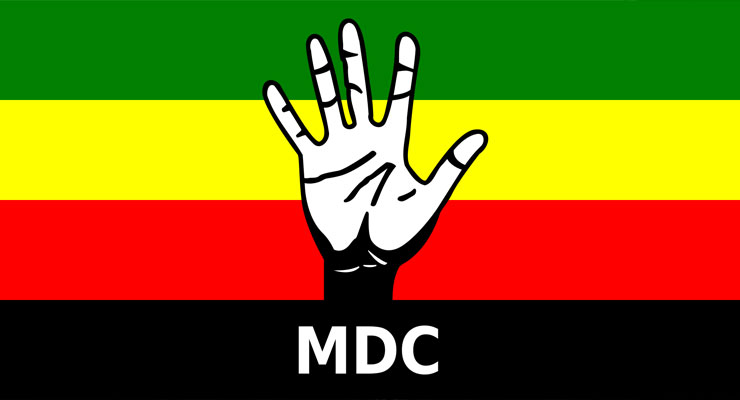
Zimbabwe’s main opposition party is proving to be its own worst enemy as it bids to topple the ruling Zimbabwe African National Congress Patrotic Front (ZANU-PF) in this year’s general elections. As never before in the public domain, the nasty succession fights which characterised the ruling ZANU-PF between 2013-2017 are now playing out in the opposition Movement for Democratic Change (MDC-T), and tempers continue to flare.
Instead of capitalizing on voter antagonism toward ZANU-PF and President Emmerson Mnangagwa’s role in the self-serving coup that led to the resignation of president Robert Mugabe after 37 years of rule, Zimbabwe’s main opposition party has stumbled. The MDC-T has been consumed with infighting over who of the three party Vice-Presidents should be acting president in the absence of longtime leader Morgan Tsvangirai who is being treated at a South African hospital for colon cancer.
The infighting reached its peak on Thursday as there was a flood of conflicting statements on who was acting president. The confusion drew criticism from a cross-section of Zimbabweans and has diverted attention towards the party’s struggles to improve services and manage a severe water crisis in Zimbabwe’s capital Harare and in the other municipalities where it wrested control from the ZANU since in 2000. The party’s three Vice-Presidents, Dr. Thokozani Khupe, Elias Mudzuri and Advocate Nelson Chamisa, each seem to be aiming to succeed Mr. Tsvangirai. Tsvangirai’s spokesperson Luke Tambironyoka and the party’s national spokesperson Obert Gutu have contributed to the public spat.
The senior MDC-T party hierarchy escalated their public clash on Thursday as they jostled to succeed ailing Tsvangirai who is now in South Africa. Tsvangirai’s spokesperson Luke Tamborinyoka in an alleged statement claimed that Chamisa was now the new acting president. Then the party spokesperson Obert Gutu insisted on Thursday that Mudzuri remained the acting president.
Later in the same day, Tamborinyoka issued a statement again, this time saying deputy Chamisa would act as president indefinitely until Tsvangirai returned. Gutu immediately interjected using his account on Twitter to say that he was authoritatively informed that Mudzuri was still the acting president.
On Wednesday, the third of the party’s Vice-Presidents Dr. Thokozani Khupe seemed to challenge the legitimacy of her two colleagues, contributing to the debacle through her Twitter handle by saying:
Three consecutive MDC-T congresses have elected yours truly as Deputy President to President @mrtsvangirai & other officers primarily to avoid a leadership vacuum at such an eventuality, & to shut any that may be artificially created by those with hidden agendas.
I was MDC-T A/President for months in 2008 on the basis of our constitution which has remained unchanged & clear on the roles of elected officers of congress. It does not give any extensive powers to any one office bearer such that without them the party is dysfunctional.
Those of us sincerely concerned about the Zimbabwean voters & their MDC-T must impress upon the 2014 congressionally elected leadership at their level to take decisive corrective measures against the use of president @mrtsvangirai’s name to propagate unconstitutional-ism.
MDC-T cannot afford the Zanu PF politics of rhetoric, self-help & free for all rumble in the jungle power take overs & decision making. We need a constitutionally ordered way of presenting ourselves to the voters in a clear & inspiring manner. It shall be well, stay blessed.
There is no doubt that MDC has been shooting itself in the foot. Its internal problems are doing serious damage to its image and will undermine its attempts to portray itself as a viable alternative to the ZANU-PF that has been seen as successfully dealing with its internal fighting following the coup that brought Mnangagwa to power last November. Personality clashes and disagreements over policy have already cost the MDC control of the House of Assembly in 2013 general elections.
ZANU-PF is looking united
The timing for the MDC’s woes is awful. While it capitalized on anger over the non-formation of an inclusive government after the coup, the MDC is now up against a ruling party that’s been revitalized under a new dispensation that has been warmly received worldwide.
The election of Emmerson Mnangagwa to replace Mugabe as its leader in December will probably reduce the odds of the ZANU-PF support dropping below the 50 percent mark during the upcoming general elections. Under the current system, the party has won every presidential vote outright since independence from Britain in 1980 when Robert Mugabe led it to power. It secured 62 percent backing in 2013 first round presidential election up from 42 percent mark in the bloody first round of the 2008 election.
Tribal concerns
Tribal and other kinship ties rooted mainly between the Shona-speaking northerners and Ndebele-speaking citizens who occupy the southern parts of the country play a relatively big role in Zimbabwe although not at the paralyzing levels of some other countries. Nonetheless, clan ties often are reflected in patterns of appointments and networks of power. For example, in 2009 Professor Welshmen Ncube, a Ndebele, had to give up party presidency for Professor Arthur Mutambara, a Shona, in the hope the party to be “acceptable to the Shona citizens.”
The same tensions are also reflected in the current infighting within the MDC. MDC congress elected Dr. Thokozani Khupe, a Ndebelem, as Vice-President in 2005. Now it seems she is being sidelined in favour of the other two Shona-speaking Vice-Presidents, Mudzuri and Chamisa, both who were never elected by congress. Mudzuri and Chamisa are appointees of Tsvangirai’s making early last year.
The general feeling is that Tsvangirai is positioning Chamisa to take over leadership of the party at the expense of Dr. Khupe who was elected by congress. This infighting will probably require Tsvangirai to come and extinguish the flames. However, his health condition remains unknown as there are conflicting statements thus far, some saying he is critical whilst other party insiders stating he is critical but stable. Things in Zimbabwe are turning.
Leave a Reply